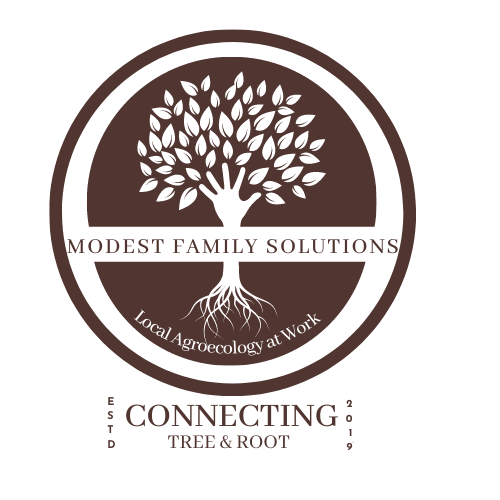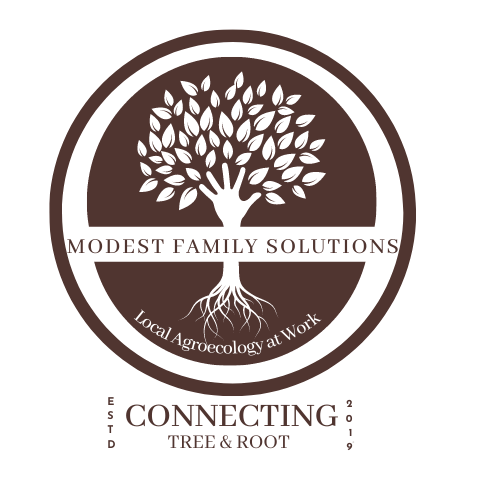Black Seed is healing work that will take place through educational programming that celebrates the rich farming traditions of Africa and the African diaspora, while confronting the history of racism and its invisible structures within the fabric of the United States. Black Seed will also offer a permaculture design course, where aspiring farmers can learn farming techniques that combine the best of perennial gardening and regenerative agriculture. At the same time, the farm will serve as a space for people to simply relax and reconnect with nature.
“I want to have lavender fields, meditation spaces outside, and to have people wake up, walk outside, and be able breathe without any haste,” said Turner.
Black Seed Agroecological Village and Farm is still in the beginning stages of development. As is the case with most new farming operations, there’s a lot of work that needs to be done before the farm can begin operating at full capacity. Modest Family search for our rural team, including new farm manager on Black Seed, Whidbey Island. While maintaining the Urban Farm at The Agroecology Center in Everett, WA. We will expand our time banking community initiative for an exchange of skills for shares, upskill, and mutually benefitting gains on projects like new fields, mulching, chipping, fence building, raised garden beds, making compost bins, introduce riparian buffers for our wetlands, and erecting new buildings.
The work of Black Seed is more important now than ever. Agroecology, which integrates ecological principles into agricultural practices, plays a crucial role in achieving the Sustainable Development Goals (SDGs), particularly those related to climate action, zero hunger, and life on land. Afro-Indigenous practices, which emphasize biodiversity, soil health, and water conservation, align closely with agroecological principles. These practices enhance climate resilience by promoting sustainable land management and reducing dependency on chemical inputs. By preserving traditional knowledge and fostering community-led initiatives, Afro-Indigenous agroecology contributes to food sovereignty, environmental sustainability, and the mitigation of climate change impacts.
Black Seed Agroecological Village and Farm was created in 2022 by Modest Family Solutions, a local nonprofit dedicated to building food sovereignty through afro-centric youth education, after it was awarded 10 acres of land by the national nonprofit Agrarian Trust.
Now, Black Seed aspires to use the newly acquired land as a space where upcoming farmers and members of the community can learn, heal, and reconnect with nature. At the same time, Black Seed will benefit the Whidbey Island community at large, through providing it with access to healthy, affordable food.
“Black Seed Farms is about bringing people back to community, harvesting food for the day, and then having it for lunch or dinner. It’s about being able to roam unapologetically free on liberated land and being able to connect,” explained Adasha Turner, the founder of Black Seed, and executive director of Modest Family Solutions.
Turner plans on transforming Black Seed’s 10 acres into a Halal production farm, wellness respite, and educational demonstration food forest regenerative agricultural site.
After the necessary infrastructure is set in place, Black Seed will distribute part of the land to aspiring farmers, with a special emphasis on serving disadvantaged members of the local community. These farmers will benefit from access to Modest Family Solutions network of distribution centers, which disseminate healthy food at affordable rates to the residents of Whidbey Island.
Education and wellness will be another critical part of Black Seed’s mission. “Black folks have a REALLY bad relationship with farming,” explained Turner, referring to the wide set of factors, including American chattel slavery and land dispossession, that have complicated many Black Americans’ relationship to agriculture and oppressive social systems. “After experiencing the effects of a broken food supply chain during the pandemic, on the many minorities community’s that look like me, my family and neighbors. I’ve realized that we can’t afford to have that. We need to heal and get on to saving ourselves. WE are capable, with the right support.” Turner summarized by saying “We distributed, grew, and processed over 4 million pounds of Halal food to our own and neighboring communities during a pandemic” Turner stops to embrace the actualization of true sovereignty.
As land prices continue to increase and impede Black farmers’ ability to access land, Black Seed will provide a space where people can heal, learn, and gain firsthand experience growing food, all while stepping away from the stress of modern life.
“It’s important to have those spaces where folks and cultures can come together, have conversations, and have healing moments,” said Turner. “We don’t have enough environments where we can stop and reset.”




